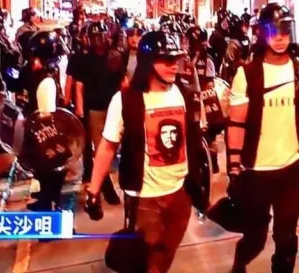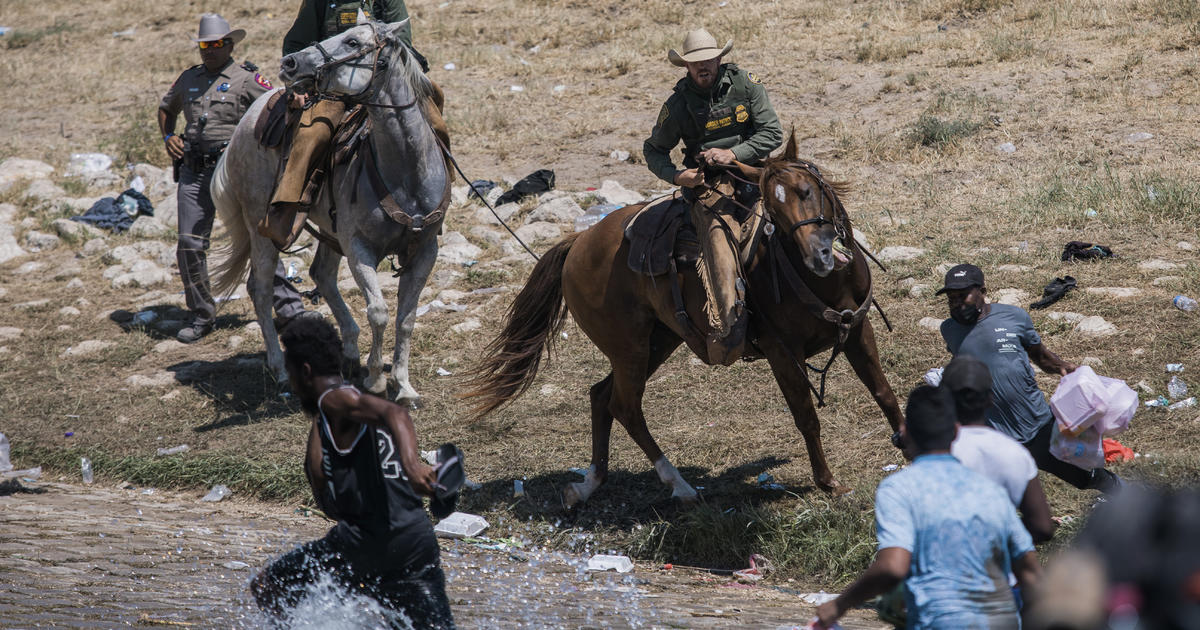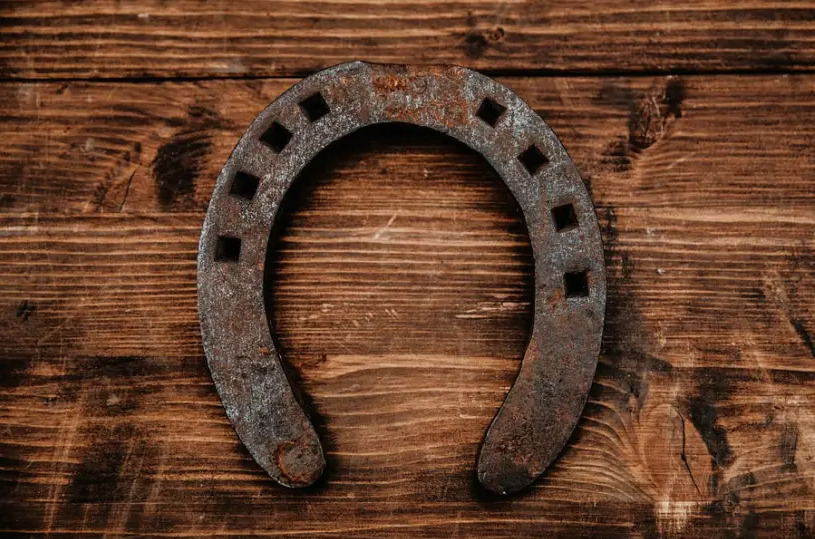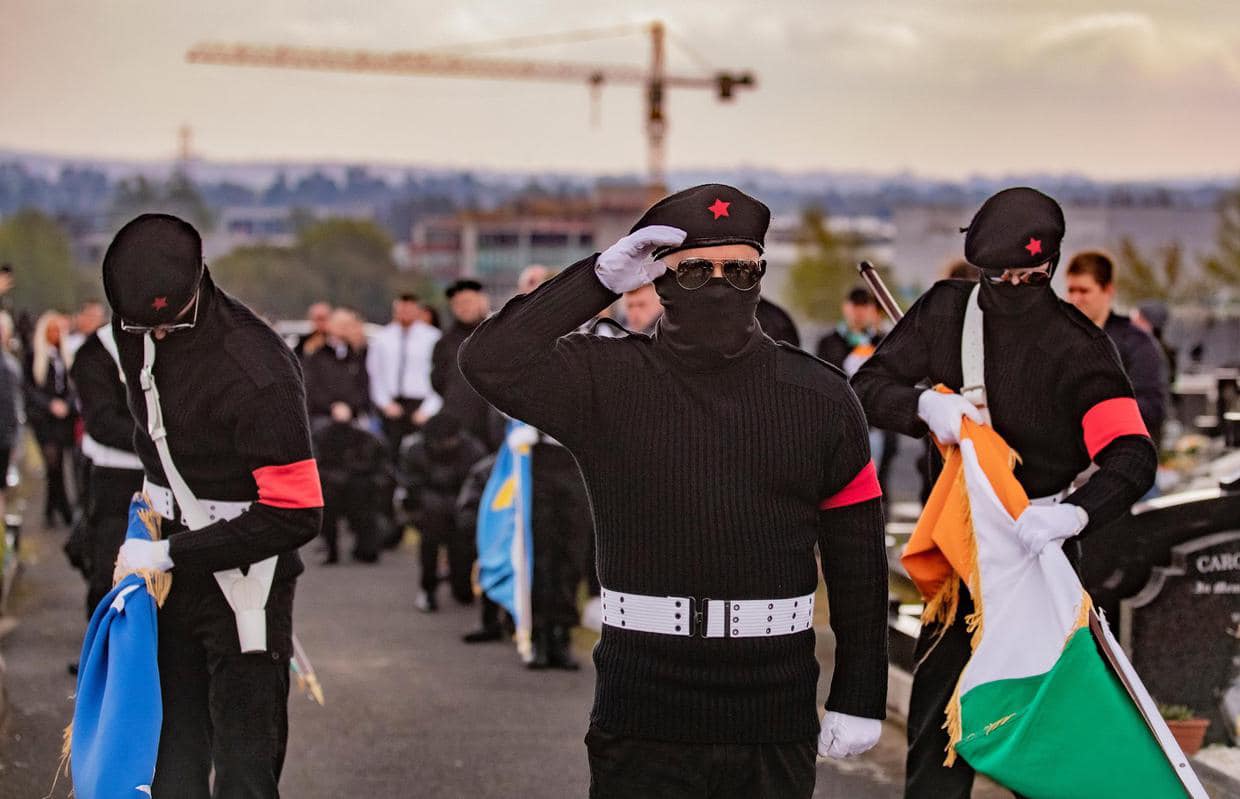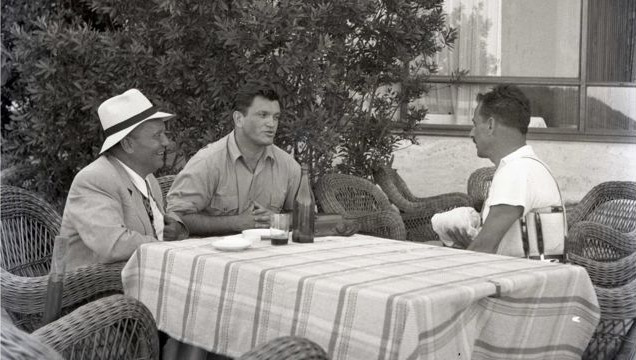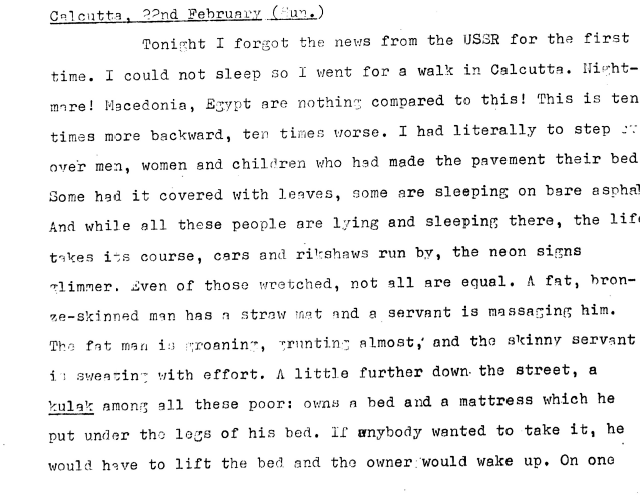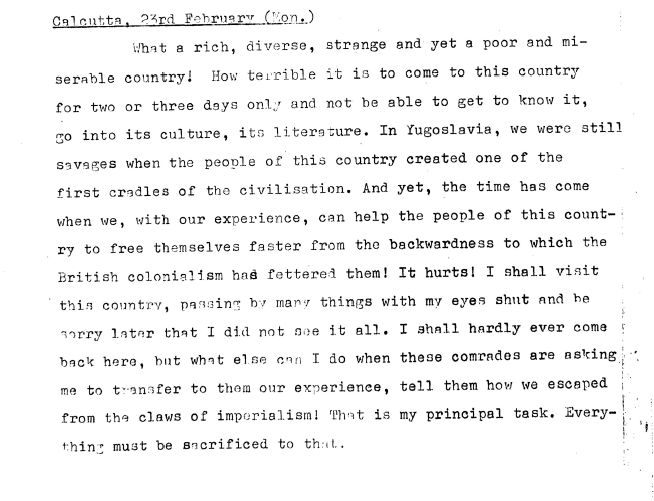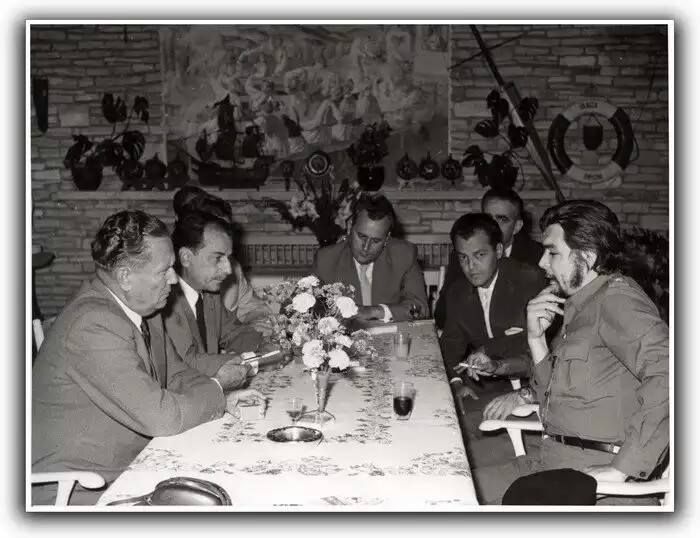On August the 18th, 1959, the President of the Republic, Josip Broz Tito, received the members of the Cuba Goodwill Mission with Ambassador Dr. Ernesto Guevara Serno at the helm. The reception was attended by State Secretary for Foreign Affairs Kocha Popovich, State Secretary for National Defense Affairs Ivan Goshniak, Secretary General of the President of the Republic Leo Mates, and adviser to the DSIP (Intelligence branch) Grgur Cvilichevich.
Comrade Tito: I greet the comrades from Cuba and express joy that today our guests are representatives of a recently completed revolution, which is striving towards independence. I would like them to feel at home. If the comrades need to hear anything from me, I will be happy to answer.
Comrade Guevara: We came to Yugoslavia to witness your experiences and to learn from it in the best possible way. We came here only to greet you, not to discuss.
Comrade Tito: But, we are very interested in your struggle and experiences, especially your current experience.
Comrade Guevara: We thought that with our revolution we rediscovered America. However, if we had met a country like Yugoslavia earlier, we might have started our revolution even sooner. If we had the opportunity to study other people’s experiences, many things would be easier for us, the solutions of which we had to search for ourselves. Yugoslavia, of course, is not the only country we visited. We also visited other countries, for example Indonesia, where we found palm trees and the same color uniform.
Comrade Goshniak: At the reception in Belgrade, they particularly complained about the leaders of Burma, who did not wish to receive them at all.
Comrade Guevara: If this conversation will not be published in the press, I can tell you what happened to us in Burma, where we stayed for only two days. We informed the Burmese of our arrival by telegram from Cairo. When we arrived in Rangoon, we were received by the Minister of Foreign Affairs, who told us that the Prime Minister was busy. We also visited the Minister of Trade and Agriculture to discuss trade and agrarian reform. In the capital of Burma, we had a discussion with the American attaché about our situation. I told him that we will go further in the implementation of the agrarian reform and the realization of our other plans, even though we are very much bothered by interference from the outside. It was a very nice conversation, even diplomatic if you will. However, after that, all lunches and visits that were scheduled in that country were cancelled. In connection with the supply of rice sugar, we were received only by some second-rate persons, and Burma did not accept this arrangement. We were very well received in Egypt and Indonesia. In India we were also well received, although a little quietly. We were well received in Pakistan as well. In Japan, you could say, we were not accepted at all. Because of the attitude of the Japanese, a trade agreement could not be reached. The chamber of commerce told us that Japan would be very happy to trade with Cuba, but that it is not in their power because there are also higher powers. We couldn’t even get a visa for Iraq. After Yugoslavia, we will visit Sudan, Ghana and Morocco.
Comrade Tito: It is the fate of all revolutions in small countries to have difficulties. Many are wary of them, some are against them, and very few support them. You will have a lot of trouble in your struggle. But when you have already thrown off the old regime, difficulties need not discourage you. It is more difficult to maintain power, but you will succeed if you are persistent. Of course, it is important not to make a major mistake now, and to proceed gradually, step by step, taking into account the international situation, internal possibilities and the balance of forces. Some things you will have to keep for better times. You need to stabilize now. In my opinion, it would be dangerous to rush into a full agrarian reform. It would be better to approach it gradually. The armed part of the revolution has been carried out in your country, the people expect something and you must implement a part of the agrarian reform. But you must also try not to allow yourself to be isolated abroad.
Comrade Guevara: What, in your opinion, would be a reasonable limit on the size of the property?
Comrade Tito: In implementing the agrarian reform, even we went gradually, although the situation was different in our country. I’m not sure what it’s like in yours. We first confiscated the land of traitors and war criminals, and then we gradually went on. I think that is the policy of your country as well. I am not familiar with the size of latifundias in Cuba, and so, it would be difficult to say how much they should be limited. It is certain that there are large, medium and small ones. Since there are mostly medium and small landowners, I would spare them for now and start with the largest ones.
Comrade Guevara: In Cuba, the agrarian reform is very mild, because ownership of 1,300 hectares of arable land is allowed. Nevertheless, the agrarian reform affects 99% of latifundistas, mainly five American companies, which have over half a million hectares of arable land.
Comrade Mates: Then it is no longer just an internal state problem, but also a problem of relations with the USA.
Comrade Tito: That is another matter. It should be announced in the form of a government declaration that these companies will not be confiscated without some compensation. By doing so, you would gain a lot in the world from a moral point of view.
Comrade Guevara: Actually, it is not a matter of confiscation but expropriation, for which compensation will be determined according to the amount of the tax return.
Comrade Tito: As Nasser did.
Comrade Guevara: The companies requested that the compensation for this land be paid immediately, and we proposed that it be done in 20 years, with 4.5% interest. We said that we can pay them immediately, if the war criminals from Cuba who are now in America are expropriated.
Comrade Cvilichevich: According to the constitution, it seems that they are obliged to pay immediately.
Comrade Guevara: The government has powers both under the constitution and from congress. We have changed the constitution and based on this change, we can undertake to pay the compensation within 20 years. Americans refer to the old constitution. We asked the Americans what the difference is between Cuba and Japan, where during the implementation of the agrarian reform it was adopted that the compensation be made within 20 years, with 2-3% interest.
Comrade Tito: The situation seems to be different here. Cuba is close to America and what happens there can affect other surrounding countries. In that part of the world, Cuba is becoming a role model, and the Americans are therefore afraid that there will be a disturbance in their neighborhood.
Comrade Guevara: Officially we cannot announce that difference.
Comrade Popovich: This is not about a statement, but about material interests.
Comrade Guevara: We know it well. The difference is that the Americans did not have land in Japan, but here they do. Regarding agrarian reform, there were differences of opinion between the communists in South America, us and our communists. We were only going to limit the latifundia for the time being, and not to implement a wider agrarian reform. However, we were forced to meet the peasants’ demands and to implement this kind of agrarian reform. We went further, although the communists and some people from our movement thought we should be careful.
Comrade Tito: Yes, that is a problem.
Comrade Cvilichevich: They complain that they are quite isolated in Latin America. There is no government, except in Venezuela, that helps them in a sense. The president himself in Venezuela, in their opinion, is an enemy of the revolution in Cuba. But the Venezuelan people are broadly anti-American and prevent the president from taking a negative stance toward them.
Comrade Guevara: Cuba is not just a little isolated. During the revolution in Guatemala, the major countries of Latin America – Argentina, Mexico and Brazil – were on the side of the progressive movement in Guatemala. Now these countries are not helping the revolution in Cuba, because they themselves are in a difficult situation. We are not isolated only from Venezuela, Ecuador and maybe Chile, but these countries are not as important in South America as the big countries.
Comrade Tito: You need to be more careful all the more.
Comrade Guevara: It could be said that the situation is such that we are amidst some preparations. The Americans are facing elections and at this moment they cannot do anything bigger against Cuba. Nicaragua and the Dominican Republic, through which the Americans can carry out aggression, are themselves in a rather difficult situation because of the revolutionary movements within. Those revolutionary groups are still quite small, but judging by ourselves, we know what possibilities arise when the guerrilla warfare starts. Perhaps Khrushchev’s trip to the USA is the reason why the Americans are a little more lenient towards Cuba at the Pan American Conference in Santiago.
Comrade Tito: The USA is not lenient only towards Cuba, but the whole situation is as such.
Comrade Popovich: How do you view the United Nations?
Comrade Tito: It would be good to hear their opinion on what could be done for them in the United Nations, to probe the terrain in case of stronger pressure. How do they view it?
Comrade Guevara: We certainly have in mind to secure a better situation for ourselves with the help of the United Nations. The first step will be to expose the Organization of Pan American States, which is an instrument of the USA. If we don’t succeed, we think we should ask for help from the United Nations. We hope that in this organization we will receive the support of the Bandung group of states, from neutral countries, and even from the East. We do not believe that we would get help from South American countries, but these countries would not be able to oppose this support head-on.
Comrade Tito: Who is your representative in the United Nations?
Comrade Guevara: He is a representative of an old orthodox party. We need to replace him since he’s quite weak.
Comrade Popovich: Will you replace him?
Comrade Guevara: We will. It is necessary that we have a stronger person in the United Nations, who will be more active and enter into relations with the representatives of the countries that are fighting for their independence. When Fidel Castro received a decoration from the Algerians, he said that two things were important to him then: one – that he received a decoration from the Algerians, and the second – that on the same day “Time” magazine launched an attack on him.
Comrade Tito: “Time” is always the first to speak on behalf of the reaction.
Comrade Guevara: That magazine is widely read throughout world, even in Asia. Yugoslavia is the only country where we have not seen it.
Comrade Mates: They have editions in foreign languages as well.
Comrade Guevara: We have a text on agrarian reform in English. We brought it, but we don’t know who to give it to. We also have it in Spanish, but it is certainly easier for you to read it in English.
Comrade Mates: I will take it.
Comrade Tito: What is the situation with the armed forces in Cuba? Do they have modern weapons?
Comrade Guevara: We have light weapons of North American origin, launchers, bazookas, some mines and machine guns of Belgian origin. We have no anti-aircraft defenses, aviation, and even less airmen.
Comrade Mates: It is more difficult to be without pilots than without planes, because planes can be bought.
Comrade Guevara: The pilots mostly defected from Cuba, because almost all of them were with Batista’s regime. There are very few left.
Comrade Tito: It is very important that you have a solid army, morally and politically strengthened, so that in the event of a conflict it would not defect to the other side… The conditions for aggression against Cuba are not so easy, however, because it is an island.
Comrade Mates: But they have no naval defense.
Comrade Tito: An invasion is not that dangerous for them, because that would be a major aggression. Far more dangerous is an airborne landing, which can be carried out with several planes.
Comrade Guevara: The landing could only come from the USA. But we are not afraid of such actions, because we have unity in the country, especially among the peasants.
Comrade Tito: That is very important.
Comrade Guevara: Paratroopers who would land in Cuba do not know the terrain. They would not be able to go further than the landing place, because the peasants would attack them. They would have to turn against the peasants and thus be quickly disabled.
Comrade Camizares: It is a well-known US tactic to always rely on the armed forces in South American countries. However, Cuba has a solid army, which grew up in the revolution, and which is unique, like the people themselves. Events similar to those in Guatemala cannot occur in Cuba, because the army is on the side of the revolution.
Comrade Tito: That is why it is important to keep the peasantry on your side. In order to achieve this, you should go for the implementation of the agrarian reform, because it is the basic driving force for the consolidation and further development of the revolution. We wish you to overcome all the difficulties you have with great success. Our people sympathize with all nations fighting for independence. If you preserve unity in the country and if you have a strong and well-armed army, even if it is not large, it will be difficult to interfere from the outside. Yugoslavia was almost in a worse position. During the war, we fought against Hitler’s Germany, the greatest power that had enslaved the whole of Europe, and also against Italy, Bulgarian and Hungarian fascists and internal quislings. The Quislings themselves were initially outnumbered by us.
Comrade Guevara: We got acquainted with the various stages of your great struggle. We were also in the museum in Belgrade. We consider your victory in the war to be truly epic. We are happy that our revolution cost only 20,000 lives. That is why we can understand the magnitude of the victims of the Yugoslav people, who sacrificed 20,000 people in just one battle. We also know that your wish for us to be successful does not represent courtesy, because we saw during our trip in Yugoslavia that we enjoy sincere sympathy from your people. Yugoslavia has already solved many problems, and we understood the importance of your successes and experience. We will try to convey them to our people in the most adequate way possible. In foreign policy, we will strive to be on non-bloc positions, on the line of neutralism policy, together with nations that follow their own independent paths.
Comrade Tito: If you need help and support in the United Nations, you can count on us. We will certainly support you, as we support all nations that are fighting for their independence. What about the economic relations between Cuba and Yugoslavia?
Comrade Cvilichevich: They do not have direct instructions from their government in this regard.
Comrade Guevara: Yes, it was not included at the beginning of our journey and we did not have the possibility to negotiate on this issue. We are doing our best to establish as many contacts as possible so that we can provide our government with the most complete information possible.
Comrade Mates: Our Goodwill Mission started discussions in Cuba about the purchase of 140,000 tons of sugar, which were later continued through the embassy in Washington.
Comrade Guevara: We talked about it with Undersecretary of State Velebit. He told us that the proposal should be revised, given that Yugoslavia will have an extraordinarily rich harvest of sugar beets. He suggested that that quantity be reduced, that is, that your proposal should be made more concrete in order to match the current possibilities.
Comrade Tito: Have they asked any other question?
Comrade Mates: They have a general interest in all issues.
Comrade Tito: Will they visit anything else in Yugoslavia?
Comrade Cvilichevich: They will visit the “Third of May” shipyard. They are interested in ships and electrical household appliances. They will visit “Litostroj” factory in Ljubljana.
Comrade Tito: There are more factories of electrical appliances for households in Yugoslavia.
Comrade Mates: It is best that they visit Maribor.
Comrade Guevara: We are also interested in tractor and agricultural machinery factories.
Comrade Tito: They could visit such a factory in Osijek.
Comrade Popovich: They are unable to visit all the factories.
Comrade Guevara: I see a great possibility for us to buy electric generators in your country.
Comrade Cvilichevich: They visited the “Rade Končar” factory and the approximate prices they received at the factory are fitted for them.
Comrade Tito: In Zagreb, there is also the company “Goran”, which produces household appliances.
Comrade Mates: Our Mission of Goodwill proposed to establish offices of affairs, if not embassies, in the capitals of Yugoslavia and Cuba.
Comrade Tito: Where do you have an embassy nearby?
Comrade Guevara: We had embassies everywhere where life was good. I apologize for our government’s relations with Yugoslavia. It is a bit difficult to explain, but there was a certain fear of Yugoslavia as a socialist country.
Comrade Tito: – … we prefer saying as a “communist” country!
Comrade Guevara: I can assure you that as soon as I come to Cuba, I myself will work on opening a representative office in Belgrade, with the ambassador or chargé d’affaires at first.
Comrade Goshniak: Will they remain in our country a bit longer?
Comrade Cvilichevich: They must travel to Cairo on August 21st, where they will stay for a day, and continue their journey to Sudan.
Comrade Goshniak: I asked that because I assume, since they are still soldiers, that they might be interested in seeing some of our units, military schools, etc.
Comrade Guevara: In Belgrade, we already have an agreed contact and talks with some comrades from the army. Otherwise, our time is very limited.
Comrade Cvilichevich: They were at the place where the Fourth enemy offensive was conducted. One of our Majors explained in details the operations at that time, and since they are fine soldiers, they took a lot of interest.
Comrade Guevara: We are interested in sending a certain number of people to study in Yugoslavia. Only, I think it’s a matter of language, because our peasants barely know how to read and write.
Comrade Mates: So far, learning our language has not been a serious problem. Students from Asia and Africa quickly mastered it.
Comrade Tito: Sudanese, Indonesians and others study in our schools.
Comrade Guevara: Old people cannot go to school. After all, in our struggle we had one old man, who was 65 years old. In India I spoke to Krishna Menon about establishing relations and he told me to send a professor or a doctor to India as our representative. I laughed and said: what professor, when we don’t have one?
The members of the Goodwill Mission then said goodbye to comrade Tito and thanked him for allowing spending over an hour in talking to them.
Transcript: Josip Broz Tito Archives
Translation: RNP-F
